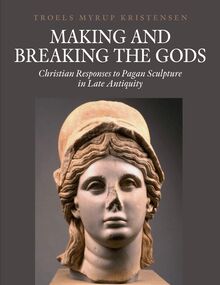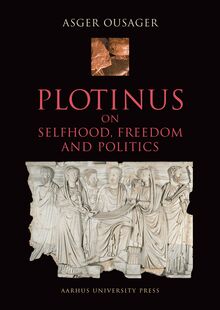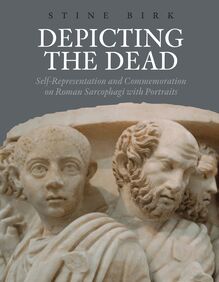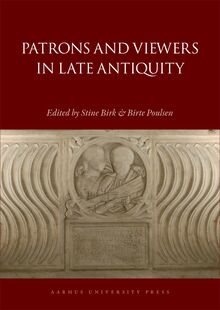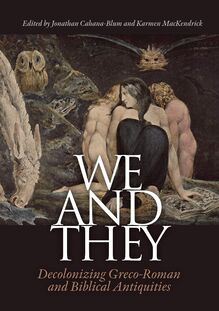We and They , livre ebook
153
pages
English
Ebooks
2019
Obtenez un accès à la bibliothèque pour le consulter en ligne En savoir plus
Découvre YouScribe en t'inscrivant gratuitement
Découvre YouScribe en t'inscrivant gratuitement
153
pages
English
Ebooks
2019
Obtenez un accès à la bibliothèque pour le consulter en ligne En savoir plus
Publié par
Date de parution
27 septembre 2019
Nombre de lectures
2
EAN13
9788771849370
Langue
English
Poids de l'ouvrage
4 Mo
Contents INTRODUCTION 7 Karmen MacKendrick and Jonathan Cahana AESCHYLUS PERSIANS Empathizing with the Enemy, or Orientalizing Them? 11 Manuela Giordano REVELATION AT THE LIMIT Mystery and Matter after the Valentinians 27 Karmen MacKendrick DECOLONIZING ANCIENT SEXUALITY Three Case Studies 47 Jonathan Cahana-Blum MYTHS AS CULTURAL VECTORS Some reflections on Ancient Greece and Modern Eth nographic Traditions 57 Luca Pucci LIBERATING LEVI A Cultural-Evolutionary Approach to Aramaic and Greek Levi Beyond Denominational Essentialism 75 Jessica van t Westeinde RELIGION AND POLITICS IN THE JEWISH-CHRISTIAN WAR IN SIXTH-CENTURY HIMYAR 97 Pieter W. van der Horst THE RAPE OF LUCRETIA Sanctity of Body and Soul in Augustine 107 Makiko Sato A FLUIDITY OF CANON AND TEXTUAL CRITICISM IN THE WORKS OF ORIGEN 117
Publié par
Date de parution
27 septembre 2019
Nombre de lectures
2
EAN13
9788771849370
Langue
English
Poids de l'ouvrage
4 Mo
WE AND THEY
Edited by Jonathan Cahana-Blum and Karmen MacKendrick
The articles collected in this volume share a very similar
goal: to decolonize our understanding of antiquity, thus
allowing modernity to converse with antiquity without
constraining the latter to be either the direct precedent or
the thoroughly other of the former. It is certainly true that
the past is a foreign country. However, history has repeatedly
demonstrated that colonialism never contributed to mutual
understanding and constructive exchange of ideas, and
that such is the dialogue we should strive forthwith our
contemporaries as well as with our ancestors. WE
AND
THEY
A A R HUS STUDI ES Decolonizing Greco-Roman
IN M EDITER R A NEA N A NTIQUIT Y a
VOLUM E XIV and Biblical Antiquities
110788_cover_we and they_r2_.indd 1 30/08/2019 11.10We and They
Decolonizing Greco-Roman
and Biblical Antiquities
110788_we-and-they_.indd 1 16/08/2019 09.43.38Aarhus Studies in
Mediterranean Antiquity
(ASMA)
XIV
ASMA is a series of monographs and anthologies published by the research
programme Classical Antiquity in the Department of Culture and Society,
Aarhus University, Denmark. Te programme includes researchers from a
wide range of disciplines studying Graeco-Roman Antiquity, such as
Classical Archaeology, Classical Philology, Ancient History, the Study of Religion,
and Teology. Te aim of the series is to publish signifcant new research in
Classical Studies and to provide an interdisciplinary platform for the study
of the ancient world. Tus, the series refects both individual and collective
scholarly engagements with new and innovative research of the highest
international standard.
110788_we-and-they_.indd 2 16/08/2019 09.43.38Aarhus Studies in We and They
Mediterranean Antiquity
(ASMA) Decolonizing Greco-Roman
and Biblical Antiquities
XIV Edited by
Jonathan Cahana-Blum
ASMA is a series of monographs and anthologies published by the research
and Karmen MacKendrick programme Classical Antiquity in the Department of Culture and Society,
Aarhus University, Denmark. Te programme includes researchers from a
wide range of disciplines studying Graeco-Roman Antiquity, such as
Classical Archaeology, Classical Philology, Ancient History, the Study of Religion,
and Teology. Te aim of the series is to publish signifcant new research in
Classical Studies and to provide an interdisciplinary platform for the study
of the ancient world. Tus, the series refects both individual and collective
scholarly engagements with new and innovative research of the highest
international standard.
Aarhus University Press |
110788_we-and-they_.indd 2 16/08/2019 09.43.38 110788_we-and-they_.indd 3 16/08/2019 09.43.38We and They
© The authors and Aarhus University Press 2019
Cover by: Jørgen Sparre
The book is typeset in Adobe Garamond
E-book production: Narayana Pr ess
ISBN 978 97 7184 937 0
ISSN 1399 2686
Aarhus University Press
Finlandsgade 29
DK-8200 Aarhus N
Denmark
www.unipress.dk
International distributors:
Oxbow Books Ltd.
The Old Music Hall
106-108 Cowley Road
Oxford, OX4 1JE
United Kingdom
www.oxbowbooks.com
ISD
70 Enterprise Drive, Suite 2
Bristol, CT 06010
USA
www.isdistribution.com
Published with the financial support of:
Aarhus University Research Foundation
Danish Council for Independant Research (Sapere Aude)
110788_we-and-they_.indd 4 16/08/2019 09.43.38We and They
© The authors and Aarhus University Press 2019 Contents
Cover by: Jørgen Sparre
The book is typeset in Adobe Garamond and printed
by Narayana Press
ISBN 978 87 7184 443 6
ISSN 1399 2686 INTRODUCTION 7
Karmen MacKendrick and Jonathan Cahana
Aarhus University Press
Finlandsgade 29
DK-8200 Aarhus N AESCHYLUS’ PERSIANS
Denmark Empathizing with the Enemy, or Orientalizing Them? 11
www.unipress.dk
Manuela Giordano
International distributors:
Oxbow Books Ltd. REVELATION AT THE LIMIT
The Old Music Hall
Mystery and Matter after the Valentinians 27
106-108 Cowley Road
Karmen MacKendrick
Oxford, OX4 1JE
United Kingdom
www.oxbowbooks.com DECOLONIZING ANCIENT SEXUALITY
Three Case Studies 47
ISD
Jonathan Cahana-Blum
70 Enterprise Drive, Suite 2
Bristol, CT 06010
USA MYTHS AS ‘CULTURAL VECTORS’
www.isdistribution.com
Some reflections on Ancient Greece and
Modern Eth nographic Traditions 57
Published with the financial support of:
Luca Pucci
Aarhus University Research Foundation
Danish Council for Independant Research (Sapere Aude)
LIBERATING LEVI
A Cultural-Evolutionary Approach to Aramaic and Greek
Levi Beyond Denominational Essentialism 75
Jessica van ‘t Westeinde
RELIGION AND POLITICS IN THE JEWISH-CHRISTIAN
WAR IN SIXTH-CENTURY HIMYAR 97
Pieter W. van der Horst
110788_we-and-they_.indd 4 16/08/2019 09.43.38 110788_we-and-they_.indd 5 16/08/2019 09.43.38THE RAPE OF LUCRETIA
Sanctity of Body and Soul in Augustine 107
Makiko Sato
A FLUIDITY OF CANON AND TEXTUAL CRITICISM
IN THE WORKS OF ORIGEN 117
Anna Usacheva
BIBLIOGRAPHY 131
INDEX OF NAMES 145
INDEX OF SUBJECTS 149
110788_we-and-they_.indd 6 16/08/2019 09.43.38THE RAPE OF LUCRETIA
Sanctity of Body and Soul in Augustine 107
Makiko Sato
A FLUIDITY OF CANON AND TEXTUAL CRITICISM
IN THE WORKS OF ORIGEN 117
Anna Usacheva
BIBLIOGRAPHY 131
INDEX OF NAMES 145 INTRODUCTION
INDEX OF SUBJECTS 149
110788_we-and-they_.indd 6 16/08/2019 09.43.38 110788_we-and-they_.indd 7 16/08/2019 09.43.38110788_we-and-they_.indd 8 16/08/2019 09.43.39KARMEN MACKENDRICK AND JONATHAN CAHANA
In August 2016, 17 scholars from 9 countries and 3 continents gathered at Aarhus
University Conference Center at Sandbjerg Estate, Denmark, to address a pertinent
question: how do scholars address the we/they nexus when studying antiquity, and
how does the frame of colonialism still function within this nexus, whether overtly or
covertly? Te conference abstract specifcally noted those cases in which the diference
between antiquity and modernity was stressed to the point where the scholar subsumed
an ideal Western “we” and acted as an interpreter for the primitives of antiquity. During
the conference itself, however, the participants demonstrated how such an approach is
better understood on a spectrum, and underlined cases in which the people of antiquity
have been co-opted into further modern political (and, ironically, often postcolonial)
concerns. Tematically, the conference addressed issues of race and eth nicity , language
and materiality, and gender and sexuality, to each of which a keynote was dedicated.
It has unfortunately proved impossible to include all the papers in this volume. Tose
included, however, provide a highly representative selection of both the problems and
the solutions that were discussed during the lively three-day conference. Tese
contributions also address diferent points on the we–they spectrum, and deal with each of
the aforementioned themes.
Te book opens with three highly methodological articles, two of which were given
as keynotes in the conference. Te frst, by Manuela Giordano, addresses a classical
text that has served as a paradigm for reading modern notions of race and ethnicity
into antiquity. Aeschylus’ Persians has been championed by Edward Said as the frst
representation of the Orient vis à vis the West. Giordano amply demonstrates that such
an understanding is immersed in modern binary concepts, and that Aeschylus’ text, far
from confrming such a binary, is actually a haunting undermining of such dichotomies
in an attempt to redefne Athenian identity as distinct from both Persian and (Greek)
Homeric. Karmen MacKendrick’s “Revelation at the Limit: Mystery and Matter after
the Valentinians” engages with a diferent thrust in scholarship, in which antiquity is
projected as the essential other of modernity. Reading Valentinian Gnosticism, which
has been often considered “incomprehensibly distant from contemporary thought,”
MacKendrick demonstrates how a pertinent concept in this system, namely the Limit,
can and should be brought into interesting and challenging conversation with modern
concepts of materiality. Te third introductory article, by Jonathan Cahana, takes up
the ways in which a we/they dichotomy has hampered three otherwise sound analyses
of ancient sexuality, and argues that efacing such a dichotomy would let us engage
with the results of these analyses without the impeding baggage of colonial thought.
Each of the following articles engages with a case study under one of the major
themes. Tus, Luca Pucci, Jessica van ‘t Westeinde, and Pieter van der Horst’s essays all
Introduction 9
CONTENTS
This page is protected by copyright and may not be redistributed
110788_we-and-they_.indd 8 16/08/2019 09.43.39 110788_we-and-they_.indd 9 16/08/2019 09.43.39address issues of identity, race, and eth nicity . Pucci’s analysis demonstrates how
anthropological methods could be fruitfully applied in the historical study of ancient Greece
through what he terms “constructive comparativism,” so as to evade the “grounded
statement that the modern European thought derives recta via from ancient Greece.”
Van ‘t Westeinde employs a thoroughly modern method – the cultural-evolutionary
approach – in order to avoid a deeply entrenched modern inclination to dichotomize
between Judaism and Christianity, an approach which, in turn, is itself enmeshed with
the post-enlightenment understanding of “religion.” Van der Horst’s study addresses
a sensitive and much avoided historical instance in which Jews were the perpetrators,
rather than the victims, of religious persecution, and demonstrates how the study of
Himyar social and political history has been hampered by relegating such cases to the
impossible. No less sensitive is Makiko Sato’s assessment of the way Augustine of Hippo
reads the rape of Lucretia, and rape in general. By analyzing Augustine’s concept of
sanctitas and the way he applies it to the body and the soul, Sato questions whethe
